If there is one question that goes back to the very beginning of blogging, it’s “what blogging platform should I use?” Everyone asks this question (to Google, most likely), and everyone gets bombarded with a thousand different answers. That’s primarily because there are so many choices. In this post, we’ll discuss the WordPress vs Medium debate. Both are fantastic platforms with a lot to offer bloggers. When considering where your blog should live, you need to know there is no wrong choice here.
You would do fine with either, but hopefully, we can guide you through some of the more stand-out features for both to help make your decision a little easier.
- 1 Look Inside Yourself (or Your Blog)
- 2 What is WordPress?
- 3 What is Medium?
- 4 Social Media is King
- 5 Which Platform Gives You the Most Content Control?
- 6 Which Platform Has Better Performance?
- 7 WordPress vs Medium: Customization
- 8 At the End of the Day…
- 9 WordPress vs Medium: Which One Is Better?
- 10 Frequently Asked Questions (FAQs)
Look Inside Yourself (or Your Blog)
When considering whether to go with Medium or WordPress (.com or .org), you need to think about what you need out of your blog or publication. Is it a personal blog you’re doing as a hobby, or are you going to monetize it eventually? Are you going to sell products on your blog, and how much discussion will take place on your articles themselves versus social media? How much static content will you have?
Once you’ve got a few answers rattling around in your head, read onward.
What is WordPress?
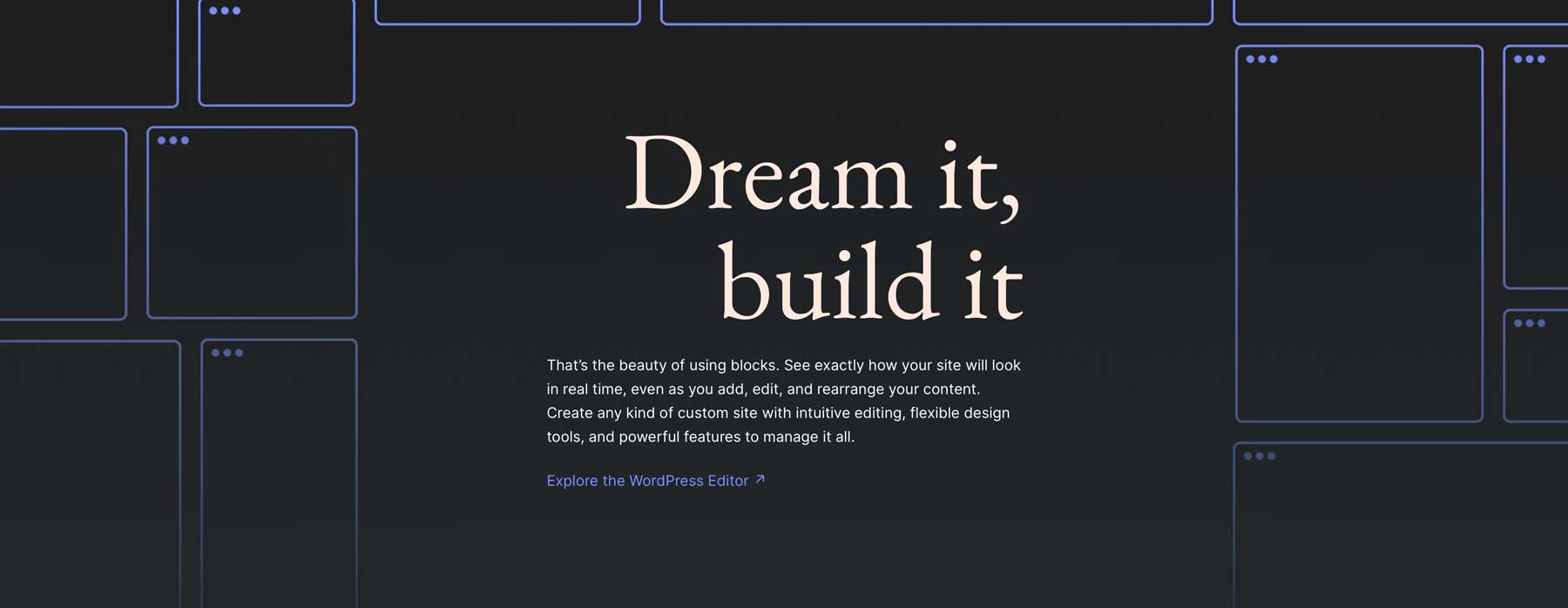
Ahhh, WordPress. You delightful beast, you. Obviously, here at Elegant Themes, we love WordPress. We use WordPress, and we promote WordPress as much as we can. Now, that doesn’t mean that WordPress is the best choice for everything all the time, but here are some of the reasons it might the right one for you.
Manage that Content, Y’all
WordPress isn’t just a blogging platform. It started that way, but since 2002, it has expanded into so much more than that. With nearly half of all websites running on WordPress, you can use the platform even if you don’t have a blog! (Blasphemy, I know.)
If your website is more than just a home to your blog, or your blog is perhaps not the primary focus of your website, WordPress may be the best bet for you. Selling your products, taking reservations and planning events, WP has you covered.
The downside to WP being a fully realized content management system (CMS) is that it can have a learning curve. For you to blow all its whistles, ring its bells, and get it to jump through hoops, you have to put in a bit more time than you do with Medium.
If you need more, you can do more. And if you need less, you don’t have to use it all. As I said in the beginning, it’s up to you and what your needs are now (and what they’ll be in the future, too).
What is Medium?
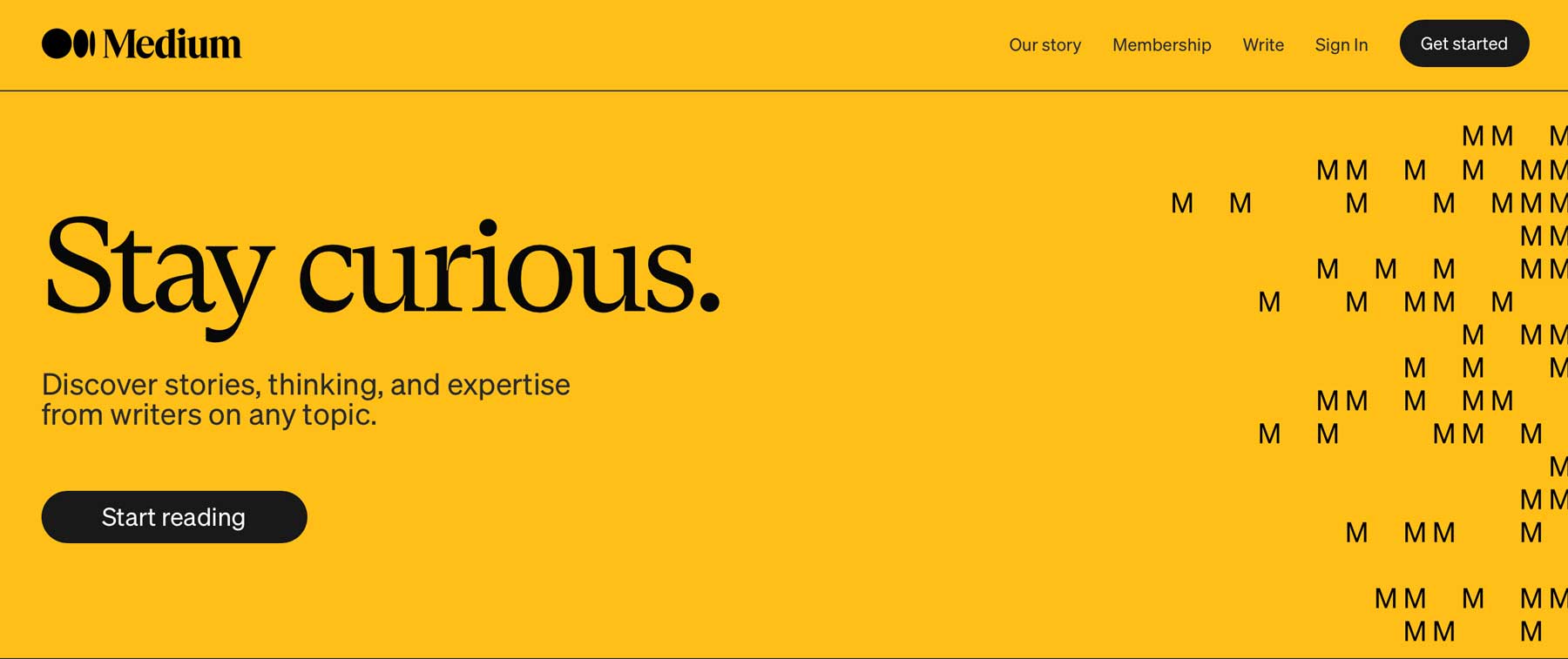
Medium is a relatively new publishing platform, launched in August 2012. That’s a full 10 years behind WordPress – at least when you consider how long WordPress has been around – but it’s become a staple among the internet’s blogging scene.
Medium Series (on Mobile)
Medium is an experimental platform in a lot of ways. It’s not beholden to any precedent, so the company can try new things and see what works. One of their neater features is called Series, which is a mobile-only publishing tool.
Similar to Instagram or Facebook stories, Medium’s series gives writers the ability to publish serialized content in a card-based magazine. You add photos and text to the cards, and as the story, you’re telling progresses over time, you continually update the same Series.
The selling point of this being mobile-only is that it’s bite-sized, easy to read and navigate, and unlike other social platforms where this type of content disappears after a while, any Series you publish remains live – just like any other blogs you’ve written.
Not everyone will care or take advantage of Series, but if you’re up for trying new formats, WordPress doesn’t have anything even similar to this.
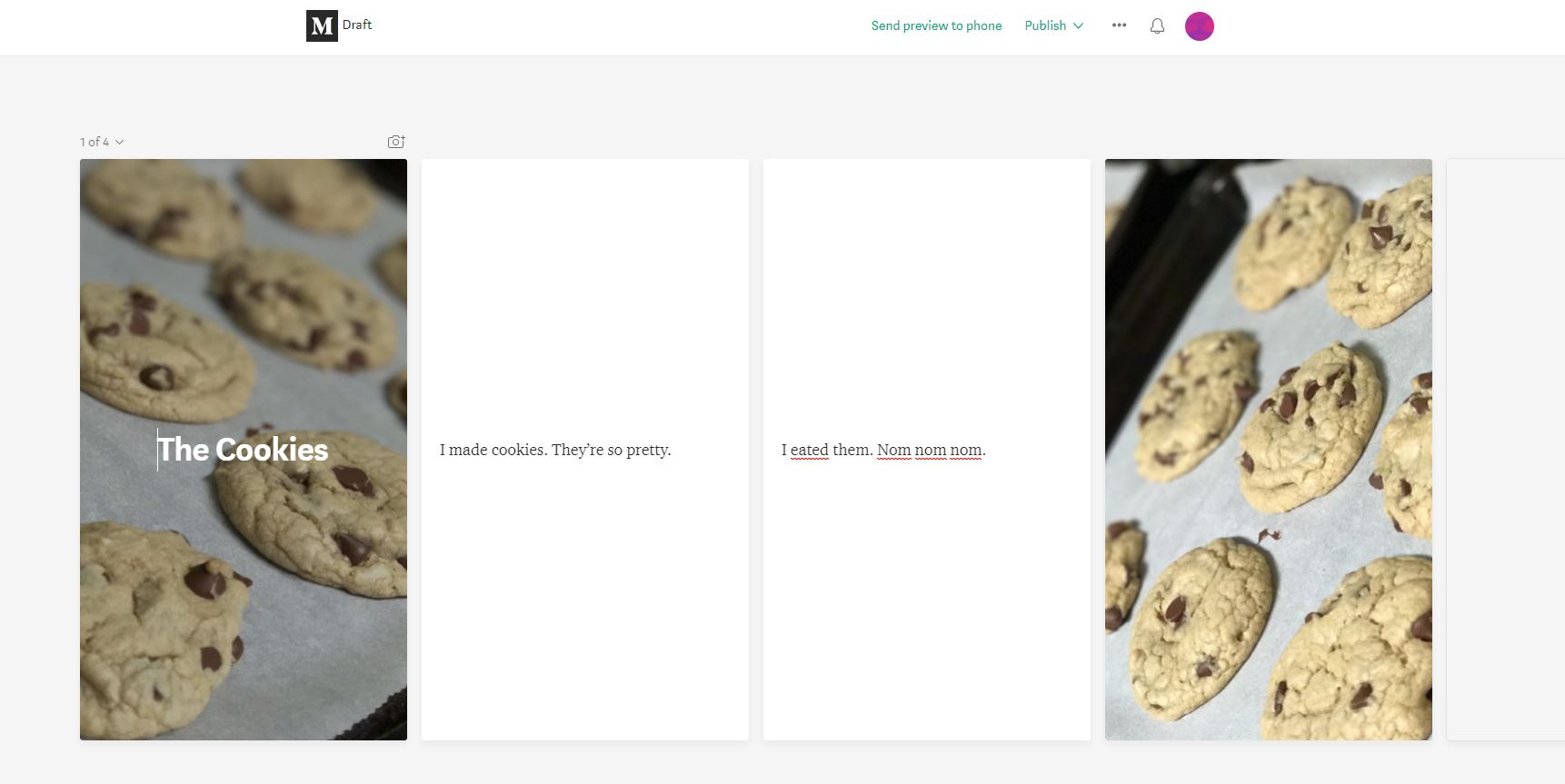
Cleanliness is Next To…
Medium is clean. No, not in terms of content rating, but in terms of design, style, and UX. It just works.
Medium is a writer’s platform if there ever was one. Sure, you can embed images and videos. But they are kept to a functional minimum. They aren’t the focus. The words are.
A white background with black text in a single column in the center of the screen. That’s all you need to get your point across. Heck, sometimes there isn’t even a menu bar at the top.
When you use Medium for your blog, you’re saying that yes, content is king and words are his bannermen.
Social Media is a huge aspect of blogging these days. Without a social media presence, your blog is dead in the water. Which platform gives you the most reach on social media? Let’s explore.
One downside to WordPress vs Medium is that because it does so much so well, it doesn’t automatically have a focus on certain features like Medium. One aspect where WordPress is lacking in comparison is social networking.
Yes, you can share your posts to any network you’re a member of, and your readers can leave comments at the bottom of posts in threads, there’s not a lot of interactivity between users within WordPress itself.
Some plugins like Blog2Social and the popular Instagram plugin Social Photo Feed by Smash Balloon do a good job in addressing that shortcoming, giving WordPress a bit more power in social settings. Most popular social networks like Facebook have a number of plugins that you can use to pull their social media benefits to your website. This is especially true in the last few years when third-party vendors have begun to bridge the gap from blogs to social media platforms.
While WordPress is not specifically made for social, it can hold its own with a little help from some stellar plugins.
Medium was started by the same fella who helped start Twitter, Ev Williams. His involvement is important because more than anything (well, outside of being a publishing platform), Medium is about social connections and people. The content is important, of course, but the number of ways that writers and their audience are fundamental to the experience.
You can clap for articles you like, share with friends and followers, and even highlight portions of text to comment directly on instead of starting a thread after everything is said and done (though that is possible, too). Then, those comments are linked back to your profile, where your followers can see them and join in on the conversation.
Pretty cool.
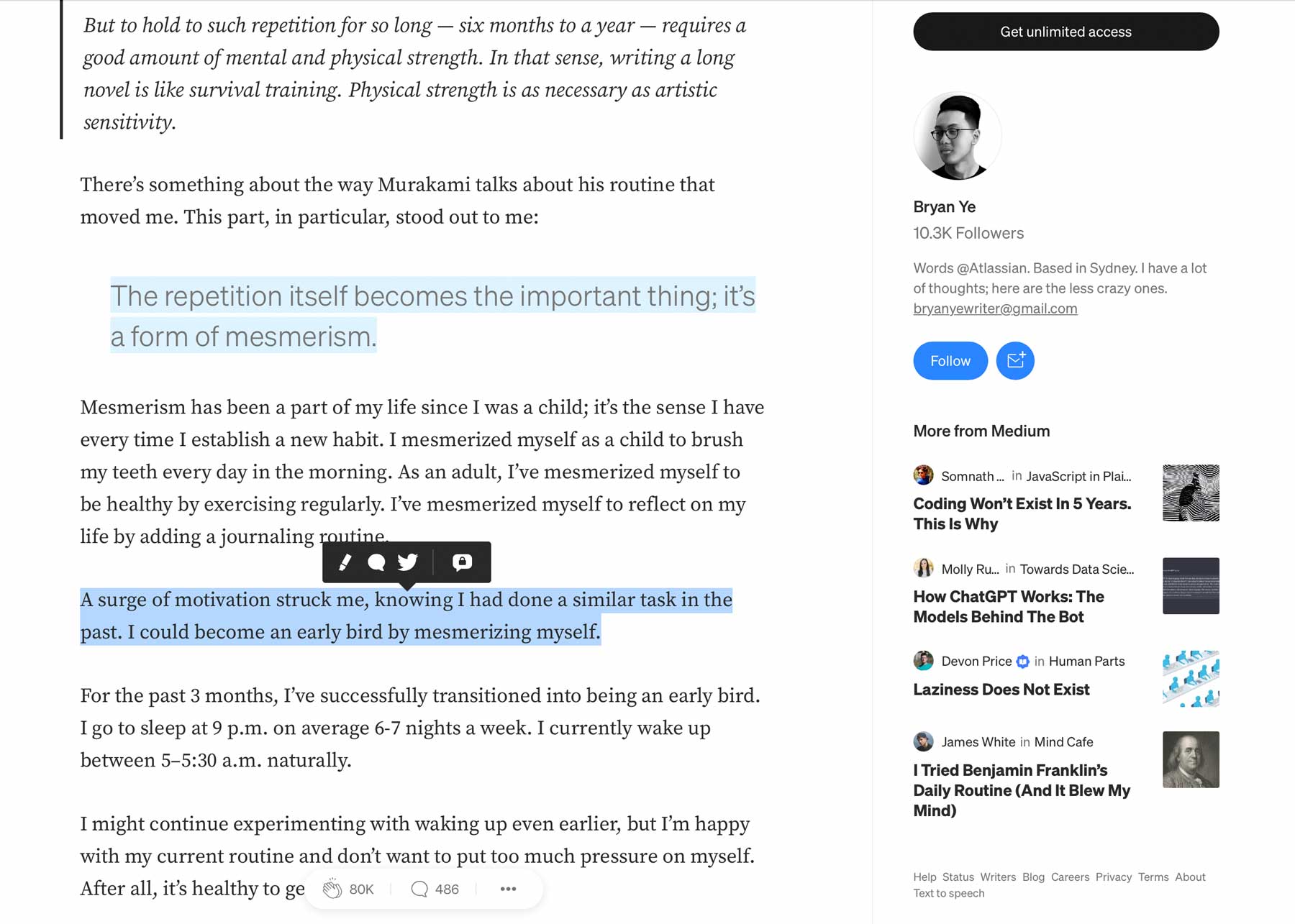
Unlike WordPress, there aren’t any social media plugins to install to share content. That being said, you can’t change the way it looks, either.
 |  |
|
|---|---|---|
| Social Media | Out of the box, WordPress isn't known for being a social media platform. That being said, there are some good plugins that can get you there. | 🥇 Winner Medium is all about social interaction. You can clap, share, and boost your posts on social media platforms easily. |
| Choose WordPress | Choose Medium |
Which Platform Gives You the Most Content Control?
There’s the age-old argument of who controls your content. If a platform goes kaput, what happens to your content? Let’s delve into the depths of content control on both platforms and see who has the edge.
WordPress Content Control
With WordPress, you get direct access to your followers. They subscribe via email, and then you can interact with them as you wish. You can segment, group, A/B test, individually reach out, whatever. You’re in control of that list, and you always know who those people are.
It may not sound like a big deal (or a lot of difference), but your audience is your bread and butter. They’re the jam on your biscuit, the avocado on your toast. They’re the…
Right. You get it.
My point is that if you’re blogging, you’re building a community. Not only that, you’re building a relationship with each person who reads your stuff.
Combine these two issues of control (both for content and for followers), and you have a big reason folks go with WordPress over Medium for blogging. Being one with the final say over everything has a lot of appeals.
It’s one of the reasons people love Divi so much when there are other hosted site-builders out there.
Medium Content Control
What do you do if Medium goes belly up? Where do your blogs go? If they live over there on Medium’s cloud, what happens when it’s all rained out?
Well, that’s kind of a big reason that folks go with WordPress. Maybe the main reason. If you’re using self-hosted WordPress (the .org version), you have total control of your files, WP installations, words, and everything. Unless something catastrophic happens or you decide it’s time to close up shop, your blog and its content will be there.
Most likely, Medium isn’t going anywhere. Even the old workhorses of blogging such as TypePad, LiveJournal, and Blogspot are still trotting along. But there will come a day when it goes the way of Friendster.
If you don’t have a backup, you lose that content. And that’s a worry. But it’s not the worry.
The real issue of control here isn’t with content. It’s with an audience. On Medium, you only have access to them via their Medium accounts. (Which does, admittedly, have links to their social profiles if they enter them.)
 |  |
|
|---|---|---|
| Content Control | 🥇 Winner No other blogging platform gives you ultimate control over you content like WordPress. You get direct access to followers. | Medium only gives you access to your contacts via their Medium accounts, which severely limits interaction. Plus, if the platform goes kaput, your content goes with it. |
| Choose WordPress | Choose Medium |
Which Platform Has Better Performance?
WordPress is Fast..Sometimes
WordPress website speed depends on various factors such as hosting provider, installed theme and plugins, and content optimization. You can make your WordPress website faster by using a good caching plugin such as W3 Total Cache, which can help speed up your website.
When using a default WordPress theme and a few plugins, WordPress is quite fast. That being said, to keep a WordPress site fast, choose a optimized theme like Divi, and limit plugins. Consider CSS, JavaScript, and HTML file handling for faster loading times.
To maintain site speed, be careful when selecting plugins from the thousands of options available. Using too many unreliable plugins can slow your site down. Stick with reputable third-party developers like 10Web to ensure your site stays speedy.
Medium is Made For Speed In Mind
Pretty much hand-in-hand with the clean, minimal style, Medium is a hot rod. Performance-wise, your blog is fast and furious and ready to win whatever street race you put it in.
From posting to browsing to reading to connecting with friends and sharing content, everything you do on Medium is pretty blazing. Because the platform is focused on one thing – publishing – it removes much of the bloat that can slow down other blogging platforms.
With Medium, writers can write, and they can write fast. Because Medium is made for writing. Fast.
 |  |
|
|---|---|---|
| Performance | WordPress is fast if you're using a default theme and limited plugins. That being said, the more you add, the more steps you need to take to keep it fast. | 🥇 Winner Out of the box, Medium is lightning fast. That's primarily because the platform is based on one thing - publishing - it removes much of the bloat found on other platforms. |
| Choose WordPress | Choose Medium |
WordPress vs Medium: Customization
What if blogging is important, but so is how your site looks? Read on to learn more about who’s the fairest of them all.
WordPress is Completely and Totally Customizable
Where Medium takes away your ability to choose a lot about the design of your blog, WordPress gives you unprecedented control. With themes, plugins, and widgets at your command, there’s nothing you can’t do (website-wise, that is. Cold fusion and perpetual motion are still out of WP’s orbit).
If you’re the kind of person who tweaks stuff constantly, adds elements, takes them away, and changes the user experience all the time, then WordPress gives you what you want. Medium might be constraining for you, but WordPress will free you from those shackles. If they’re shackles at all.
Plus, if you’re an Elegant Themes member, Divi makes it incredibly easy to build a Medium-clone that runs just as quickly. Just sayin’.
Medium Customization? What Customization?
Not everything is sunshine and lollipops in Mediumville. If you’re the kind of person who tweaks their blog all the time, working on font pairings, colors, and header images…you just might hate it.
Because you can’t do any of that. You get to upload your avatar, pick your bio, and if you have a publication (basically a collaborative blog multiple people write), you set a color scheme and a logo, that kind of thing.

But you’re not changing anything else. Medium is Medium is Medium.
You either live with it, or you’ll decide that WordPress is much more to your liking…
 |  |
|
|---|---|---|
| Customization | 🥇 Winner WordPress is the clear winner in customization due it's vast library of plugins and themes at its disposal. | Medium's minimalist styling and customization options may not be suitable for those who like to tweak settings and colors. |
| Choose WordPress | Choose Medium |
At the End of the Day…
I don’t think there’s a clear winner. There are enough benefits to both platforms that choosing one over the other leaves some nagging doubts.
So use both of them. Put your articles on both platforms!
“But B.J.,” you say, “Google will penalize me for having duplicate content! I can’t just copy and paste my articles on both WordPress and Medium!”
To which I reply: “True, friendo. But you can use Medium’s import tool!” (And here‘s why!)
When you use their import tool, your site keeps its canonical link juice, and you get access to pretty much everything Medium has to offer. It is the best of both worlds. See, it doesn’t have to be WordPress vs Medium at all.
WordPress vs Medium Alternatives
If you’re looking to compare other options besides WordPress vs Medium, take a look at some of our other head-to-head posts such as WordPress vs HubSpot, WordPress vs Wix, or our ultimate showdown post, WordPress vs Everything Else.
WordPress vs Medium: Which One Is Better?
But if your blog has to live somewhere, I do think that WordPress vs Medium is the better option, simply for the customization aspect alone.
 |  |
|
|---|---|---|
| Social Media | Out of the box, WordPress isn't known for being a social media platform. That being said, there are some good plugins that can get you there. | 🥇 Winner Medium is all about social interaction. You can clap, share, and boost your posts on social media platforms easily. |
| Content Control | 🥇 Winner No other blogging platform gives you ultimate control over you content like WordPress. You get direct access to followers. | Medium only gives you access to your contacts via their Medium accounts, which severely limits interaction. Plus, if the platform goes kaput, your content goes with it. |
| Performance | WordPress is fast if you're using a default theme and limited plugins. That being said, the more you add, the more steps you need to take to keep it fast. | 🥇 Winner Out of the box, Medium is lightning fast. That's primarily because the platform is based on one thing - publishing - it removes much of the bloat found on other platforms. |
| Customization | 🥇 Winner WordPress is the clear winner in customization due it's vast library of plugins and themes at its disposal. | Medium's minimalist styling and customization options may not be suitable for those who like to tweak settings and colors. |
| Choose WordPress | Choose Medium |
With a quality theme such as Divi, as well as killer social media plugins like Social Wall by Smash Balloon, your WordPress site can be a speedy, social media powerhouse where you can share your thoughts with the world in a beautiful way.
Frequently Asked Questions (FAQs)
Before we wrap up, let’s answer some of your most common questions regarding WordPress and Medium. Did we miss one? Leave a question below, and we will respond!

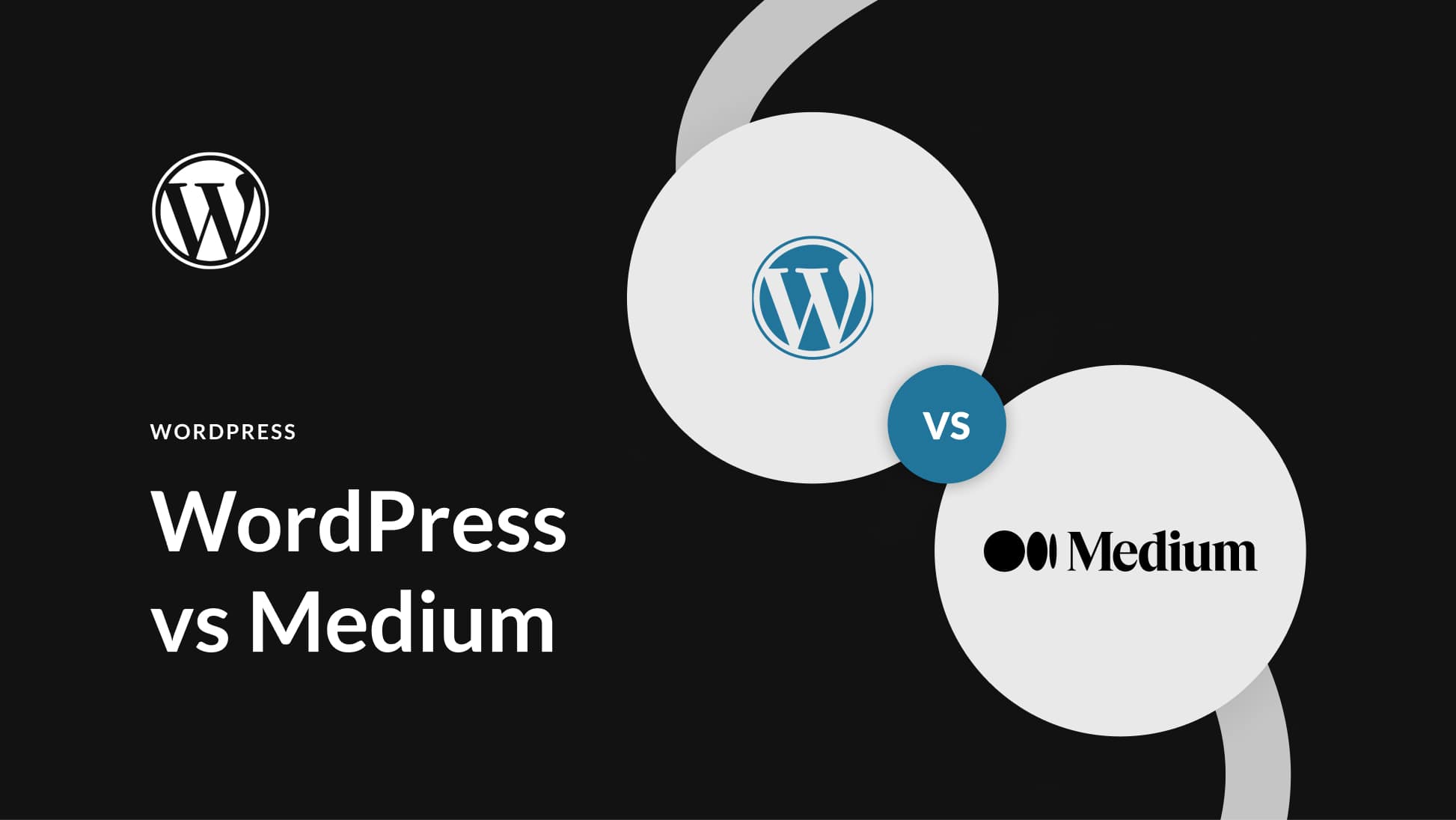




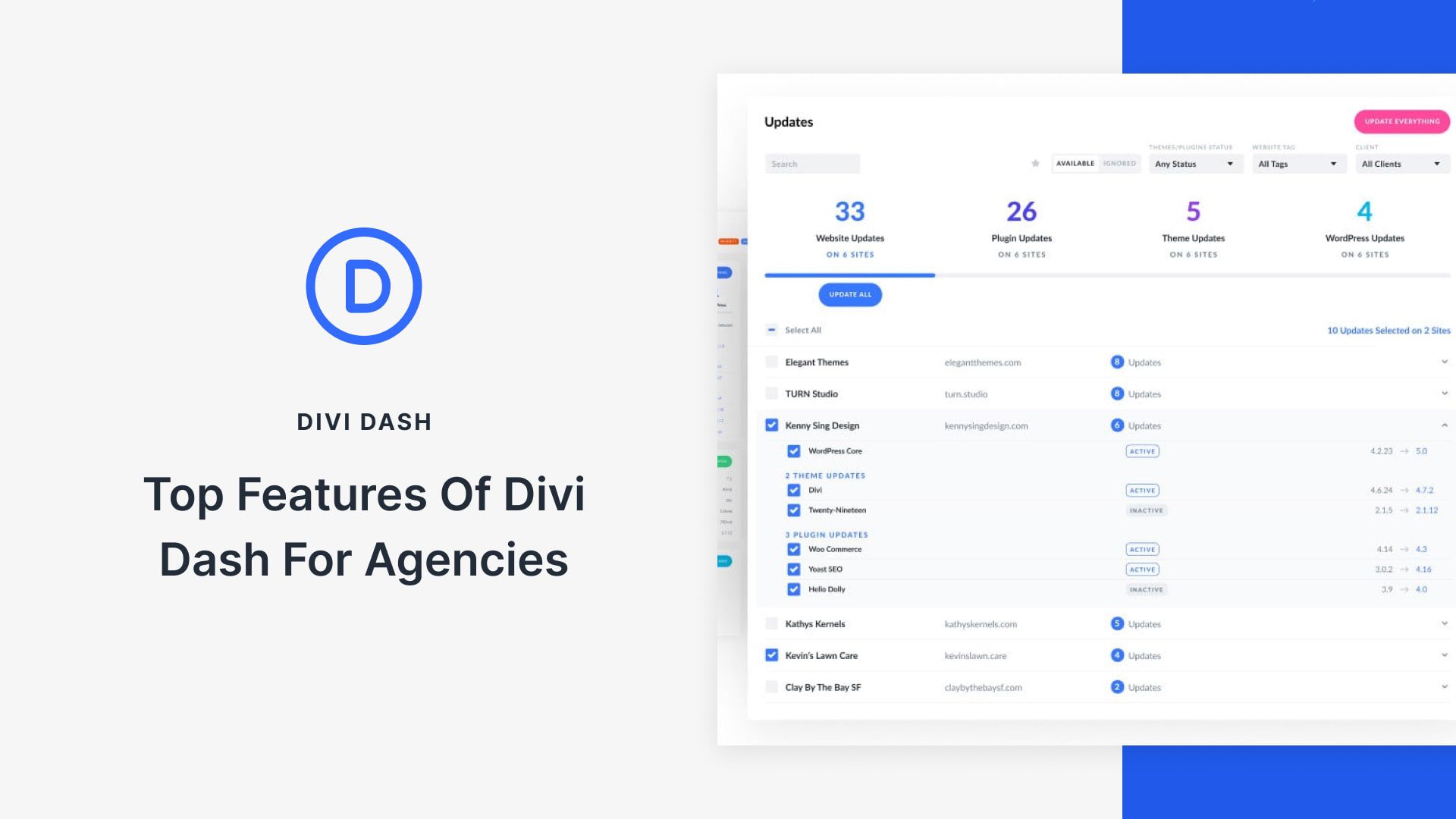


Is there an easy way to put my medium post on my Divi blog?
Although it depends
Medium is for those who are looking out to just sharing their voice while WordPress is for those who wanted to do more
And i doubt if Medium can allow one to display ads, or does it?
This is a great blog. I will try to optimize things. Medium is great social platform and drives a considerable amount of visitors.
Interesting. But when to use plugin as a wordpress application, there in the medium how does it work?
As a once-successful blogger from the days when uploading even a 300×300 pixel image to any of the blogging platforms was a major undertaking my first question would be how related are Medium’s speed and their near-exclusive focus on text? Because text is easy to do very fast, imagery is hard.
This is not to say one shouldn’t use Medium. Or that WordPress is somehow “better anyway.” Out of the box it’s not, actually. Though in terms of speed, as a reader I’m not seeing that much difference in performance between Medium and a WordPress with a similarly clean theme, a plugin that optimizes as well as resizes images, and a good caching plugin that includes lazy loading. (I’m not sure I’d agree with you that Medium posts have fewer images than the average WordPress post. But they do have lazy loading baked into their interface.)
As a big fan of the write once publish (or link) everywhere philosophy I want to thank you especially for letting us know that Medium will correctly import posts with a canonical reference to the originals. I love that! In particular it helps nullify the question of whether they platforms compete. At least for my business clients, blogging isn’t their business, it only supports their business. Being easily able to share content to Medium expands their footprint without sidelining their need to convert customers and not just attract readers.
Nice write up B.J.! Thanks!
Medium can’t compete with WordPress. Sorry 🙂
Hadn’t even considered Medium but this will make me take a look at it. Thanks!
It’s worth giving a gander. It may not work for you at all, but if it hasn’t been on your radar, this is a pretty good time to at least check it out.
A very useful post for a newbie like me!
I am searching for a plugin which can share a single post to almost all social networking sited automatically.
You are telling true and you sheared to us useful content.
according to my own opinion, WordPress is best from all other cms.
thanks to shear such kind of good content
I just know about Medium when i read this article, so i think it more comfortable to use WordPress because more user friendly.
It really can be. I love the UX that Medium gives because it’s so no-frills. Starting out with WordPress can be kind of scary.
My question is: how to put the social sharing icons floating in the post? There is a plugin or there is a way using a CSS class?
Thanx for you attention!
You can always try Bloom. It’s a plugin with membership, and it allows for some great floating sharing. That’s what we have on here. 🙂
I have been using both the platform since last few years and always add source from in the end, never knew they had plugin too for managing duplicates… great catch for me 🙂 Thanks a lot B.J.
Yeah, that changed a lot for me, too!
Medium is seen nowhere closer to WordPress.
I sure wish Elegant Themes would put some attention to the blog module for Divi or at least address why they don’t.
^EXACTLY.